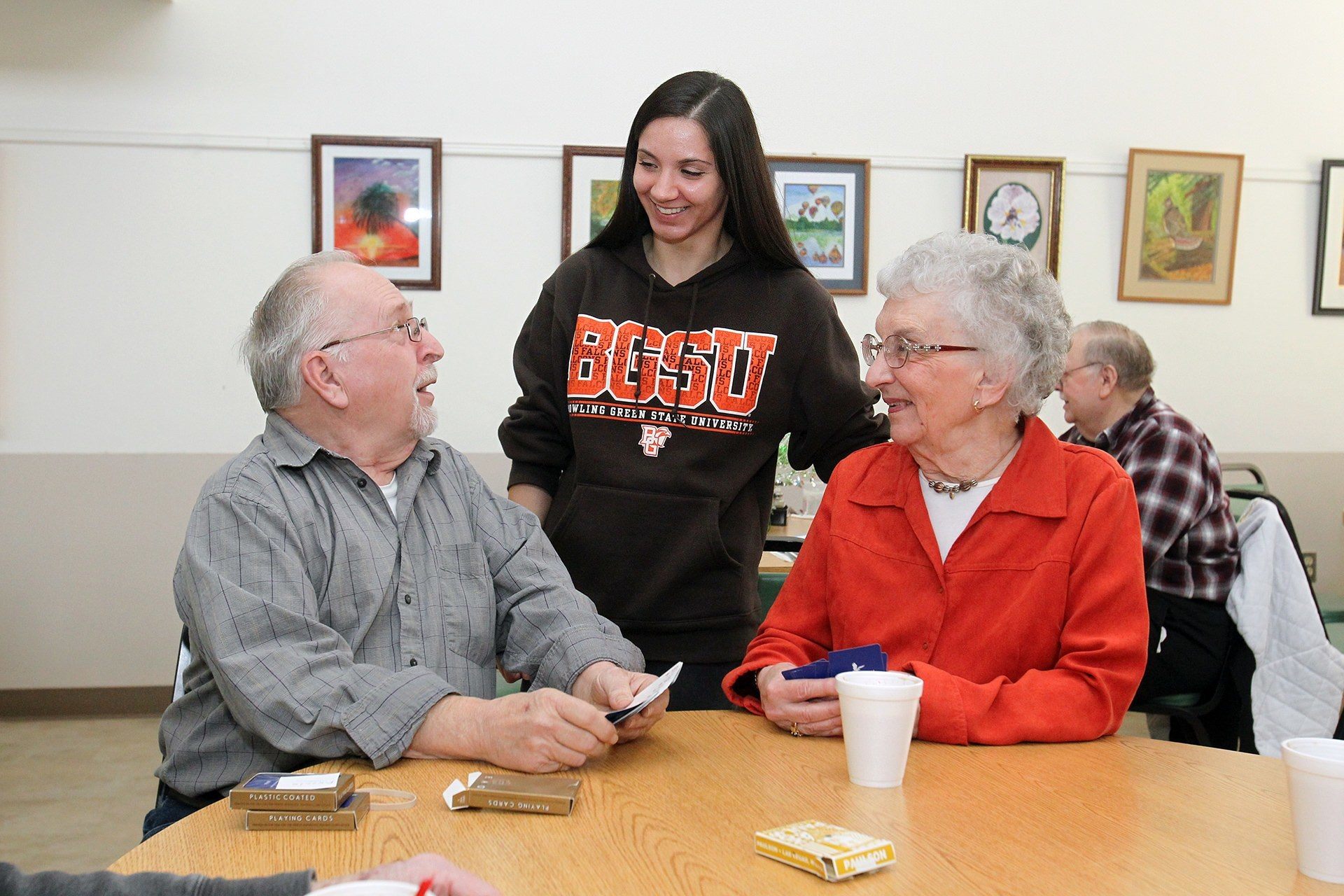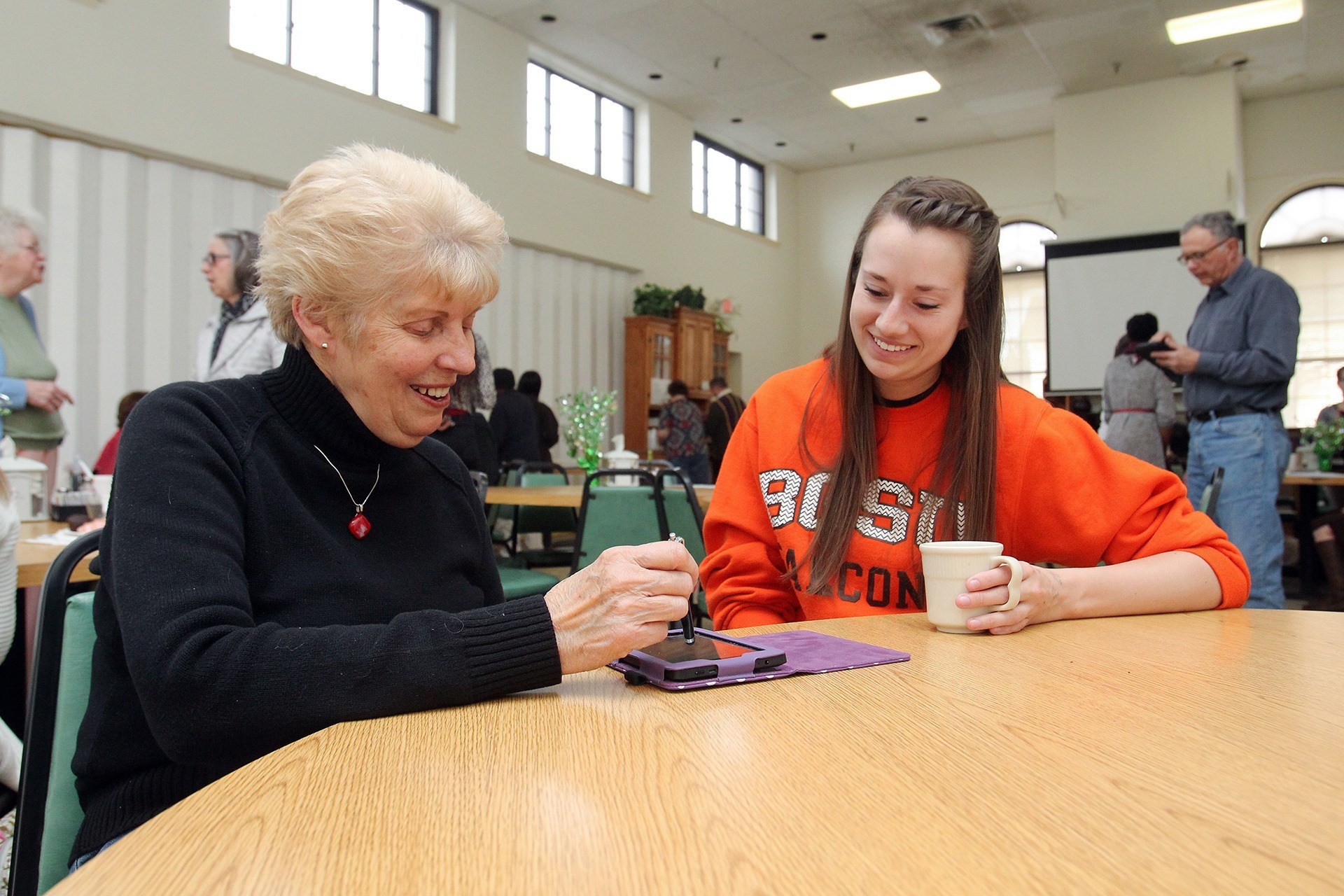
Bachelor of Science (B.S.)
Minor
Gerontology
America’s over-65 population is set to soar by nearly 50% over the next several decades – and they are looking forward to longer, healthier, more fulfilling lives. With a Bachelor of Science in Gerontology (BSG) from Bowling Green State University, you become an integral part of making that possible.
Gerontology is the study of aging – understanding all its unique physical, mental and social changes and learning how to apply that knowledge to promote programs, policies and practices that best serve those growing older.
BGSU allows the freedom to craft a gerontology career path best suited to your own skills and interests. All students start with a strong foundation in general aging studies before branching out into chosen sub-specializations (cognates) such as biology, human resources or public health. Coursework can also be tailored to prepare students for advanced degrees like occupational therapy or business administration.
Additional BGSU gerontology degree tracks include:
- Minor in Gerontology
- Bachelor of Science in Gerontology with Long-Term Care (LTC) Administration specialization (BSG-LTC)
For every gerontology career path, BGSU provides the essential instruction, real-world experience and professional development to help students succeed in shaping a better world in which to grow older.
Why study gerontology at BGSU in Ohio?
- Small classes. Average class size for upper-level gerontology classes is 35 students. This allows for more individualized instruction.
- Experiential learning. Gain a comprehensive understanding of the needs of older adults by volunteering and participating in service learning and a required practicum (400 hours senior year).
- Dedicated faculty. Gerontology is a career for people who care. It’s rooted in concern and compassion for a population both uniquely vulnerable and valued. Each of our educators is committed to teaching approaches that emphasize the importance of individuality, dignity and positive adaptations for all who are aging.
- Gerontology Student Association. Make key professional contacts and get actively involved in meaningful service projects such as crafting public awareness campaigns about fall risks or serving meals at local senior centers. Bonus: Most GSA events count toward the volunteer hours required for gerontology degree majors.
- Graduate options. Continue your studies at BGSU in our Master of Science in Interdisciplinary Gerontology or our Master of Science in Interdisciplinary Gerontology with a long-term care administration specialization.
One of fewer than 50 colleges and universities in the U.S. to offer a bachelor’s degree in gerontology.
Long-term care administration specialization
BGSU offers nationally accredited long-term care (LTC) specializations for undergraduate and graduate-level gerontology students. We’re one of a select few universities nationally to offer both undergraduate and graduate programs.
Both are accredited by the National Association of Long-Term Care Administrator Boards (NAB) as Health Service Executive programs. This designation allows graduates to sit for the nursing home administrator exam (federal, Ohio and many other states). Graduates are also qualified to take licensure exams for assisted living and community services. HSE accreditation also means your professional licenses are more portable between states.
A Bachelor of Science in Gerontology with Long-Term Care (LTC) Administration specialization combines the general gerontology coursework with additional classes like accounting, economics and healthcare management.
Students can continue their education at BGSU with a Master of Science in Interdisciplinary Gerontology (MSIG) with Long-Term Care (LTC) Administration specialization – a 100% online master’s in gerontology (an on-site supervised internship is required).
Minor in gerontology
A minor in gerontology complements many majors – nursing, business administration, communications, psychology, sociology, education, community health, speech-language pathology, audiology, social work and more.
Students must complete 21 hours of gerontology coursework – three core courses and four more from an approved list. No internship is required.
If you’re interested in minoring in gerontology, contact the Gerontology Department as soon as possible, as each individual plan of study requires program director approval.
Career - what can you do with a gerontology degree?
A gerontology degree offers opportunities to pursue work that’s both highly rewarding and in high demand.
Emerging career opportunities in gerontology are expansive and fast-growing. By 2050, the global over-60 population will double to 2 billion. Also by then, 1 in 5 Americans (nearly 90 million) will be older than 65, compared to 35 million in 2000 (source: U.S. Department of Agriculture).
This demographic shift has wide-ranging implications for virtually every corner of society – from healthcare to housing to how we structure our communities. The need for professionals who understand aging processes and are committed to helping older adults maintain health, independence and quality of life has never been greater.
Graduates with a BGSU gerontology degree can pursue leadership careers in:
- Assisted living facilities
- Community clinics
- Family service agencies
- Hospice
- Home health services
- Senior centers and adult day care centers
- Insurance companies
- Nonprofit agencies
- Public service agencies
Some students start their journey into gerontology knowing exactly where they want their studies to take them. Others take their time deciding their track. Our knowledgeable gerontology faculty can help you find your niche.
Career paths
- Medical and health services manager
- Social worker
- Nursing home administrator (licensure requires LTC specialization)
- Medicare advisor
- Health marketing communications
- Senior housing project manager
Quick Facts from the Bureau of Labor Statistics
97% of graduates in the College of Health and Human Services have jobs, start a business or graduate within 6 months of graduation.
Curriculum
The bachelor’s general gerontology degree program requires 122 credit hours, which include:
- 36 hours of BG Perspectives (general requirements in written communication, social and behavioral sciences, natural sciences, humanities and arts and cultural diversity)
- 51-52 hours in degree program courses
- 20+ hours in cognate area
- 11 hours Practicum, usually senior year
The curriculum begins with a solid liberal arts foundation, followed by a core group of gerontology and social science courses, as well as cognate courses. A student’s chosen cognate area (sub-specialization) can range from biology to business administration and requires approval from the gerontology faculty advisor.
General gerontology students complete a 400-hour practicum with a program, agency or institution serving older adults. (Meanwhile, students in the long-term care specialization at the undergraduate level complete a 1,000-hour practicum.) Placements are generally near the University to allow for close faculty supervision.
Graduates with a bachelor’s degree in gerontology will be expected to:
- Critically evaluate contemporary policies, practices and cultural issues related to older adults, gerontology and long-term care
- Demonstrate mastery of key concepts related to aging and societal responses in meeting the needs of the aging population
- Communicate knowledge about aging to diverse audiences orally and in writing

Sample courses
- Aging, Individual and Society
- Mental Health and Aging
- Health and Aging
- Applied Social Gerontology
- Interviewing and Observation
The Gerontology program is part of the Department of Human Services in the BGSU College of Health & Human Services
Accreditation
Bowling Green State University [BGSU] is accredited by the Higher Learning Commission. BGSU has been accredited by the Higher Learning Commission since 01/01/1916. The most recent reaffirmation of accreditation was received in 2022-2023, with our next reaffirmation of accreditation scheduled for 2032-2033. Questions should be directed to the Office of Institutional Effectiveness.
The Gerontology program is accredited by the National Association of Long-Term Care Administrator Boards (NAB) and is in good standing.
Updated: 08/15/2024 02:06PM

